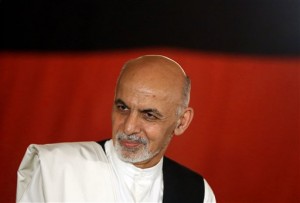JALALABAD, Afghanistan – The Islamic State of Iraq and Syria (ISIS) group claimed responsibility for a suicide attack in Afghanistan Saturday that killed 33 people and wounded more than 100 others, President Ashraf Ghani said, in what appears to be the first major attack by the jihadists in the country.
Ghani’s government has repeatedly raised the ominous prospect of ISIS making inroads into Afghanistan, though the group that has captured swathes of territory in Syria and Iraq has never formally acknowledged having a presence in the country.
The Taliban have seen defections to the group in recent months, with some self-styled ISIS insurgents voicing their disaffection with their one-eyed supreme leader Mullah Omar, who has not been seen since the 2001 US-led invasion of Afghanistan.
On Saturday a suicide bomber killed 33 people and wounded 115 others outside the state-run Kabul Bank in the eastern city of Jalalabad as government officials were drawing their salaries, in the deadliest attack since November.
The scene of the bombing showed the scale of the carnage with victims lying in pools of blood and body parts scattered across the ground.
“Who claimed responsibility for the horrific attack in Nangarhar today? The Taliban did not claim responsibility for the attack, Daesh (ISIS) claimed responsibility,” Ghani said, without offering any further details.
A person purporting to be an ISIS spokesman said in a call to AFP that the group was behind the bombing. An online posting allegedly from ISIS made the same claim, which could not be immediately verified.
“Thirty-three dead bodies and more than 100 wounded were brought to the hospital,” Dr Najeebullah Kamawal, head of the provincial hospital, told AFP.
The UN gave a higher toll, saying 35 people had been killed and provincial government spokesman Ahmad Zia Abdulzai said 115 people were wounded, four of them critically.
Separately, two explosives-rigged motorcycles were discovered in Jalalabad and destroyed with controlled detonations, the interior ministry said.
Ghani strongly condemned the attack, in which children counted among fatalities, his office said in a statement.
“Carrying out terrorist attacks in cities and public places are the most cowardly acts of terror by terrorists targeting innocent civilians,” he said.
Pakistan’s Prime Minister Nawaz Sharif also condemned the assault.
Saturday’s carnage came as Afghanistan braces for what is expected to be a bloody push by the Taliban — still the most potent threat to the government — at the start of the spring fighting season.
However, the Taliban swiftly issued a strong condemnation of the attack and denied responsibility — as it often does for assaults with large civilian casualties.
“The announcement by the ISIS today is alarming, if verified, and would mean that Afghanistan should prepare for a bloody summer — maybe the bloodiest in the past 14 years,” Haroon Mir, a Kabul-based political analyst, told AFP.
“We have been seeing Taliban commanders switching allegiance to ISIS and raising their black flag… but the ISIS presence has never been confidently confirmed and we still have to be cautious about claims made in the name of ISIS.”
‘Indiscriminate tactic’
The militants have stepped up attacks on government and foreign targets since Washington announced a delay in troop withdrawals from Afghanistan.
The number of civilians killed and wounded in Afghanistan jumped 22 percent in 2014, a recent UN report said.
The United Nations Assistance Mission in Afghanistan (UNAMA) attributed the rise in attacks to an intensification in ground fighting, resulting in a total of 10,548 civilian casualties last year.
In a statement UNAMA condemned the Jalalabad attack and the “indiscriminate tactic it represents, which is exacting such an unacceptable toll on Afghan civilians”.
On Saturday, after months of stalemate, the new government announced appointees filling every remaining post in cabinet — save the crucial one of defence minister.
Fierce public criticism has linked the leadership vacuum — which comes as NATO troops pull back from the frontlines after 13 years of conflict against the Taliban — to the uptick in attacks.
NATO’s combat mission formally ended in December but a small follow-up foreign force has stayed on to train and support the local security forces.
US President Barack Obama last month backpedalled on plans to shrink the US force in Afghanistan this year by nearly half, agreeing to keep the current level of 9,800 US troops until the end of 2015 in an overture to Ghani.
The Taliban, who have waged a deadly insurgency since they were ousted from power in late 2001, warned that the announcement would damage any prospects of peace talks as they vowed to continue fighting.
